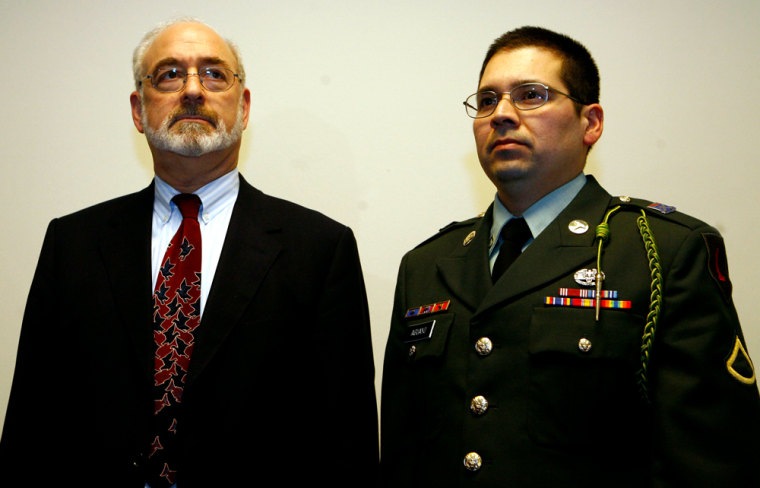A U.S. Army medic who jumped out a window of his base housing and fled to California to avoid a redeployment to Iraq was convicted of desertion Tuesday at a court-martial. He was sentenced to eight months in prison — far short of the maximum seven-year sentence.
Spc. Agustin Aguayo, 35, who refused to return to Iraq because he believes war is immoral, admitted the less serious charge of being absent without leave but was unsuccessful in contesting the more serious desertion charge. He and his attorneys turned to each other and smiled as the judge, Col. R. Peter Masterton, read out the sentence.
In a shaky voice, Aguayo told the court at the Army’s Leighton Barracks near Wuerzburg that his convictions led him to flee his base rather than go back with his unit.
“I respect everyone’s views and your decision, I understand that people don’t understand me,” he testified. “I tried my best, but I couldn’t bear weapons and I could never point weapons at someone.”
Aguayo added: “The words of Martin Luther come to mind, ‘Here I stand, I can do no more.”’
Masterton sided with prosecutors in finding him guilty of desertion. He also was convicted of missing a troop deployment.
Since Aguayo has been jailed for 161 days awaiting trial, he could be free within a few weeks. Masterton also ordered that Aguayo be reduced in rank to private, forfeit his pay, and receive a bad conduct discharge at the end of his sentence.
Capt. Derrick Grace, the lead prosecutor, said being absent without leave was by itself grounds for a desertion conviction.
“The accused was supposed to deploy with his unit to Iraq, and that was important to do,” he said. “Instead of deploying with his unit, the accused decided to jump out a window and run away.”
Served a year in Tikrit
Aguayo, assigned to the 1st Infantry Division’s 2nd Brigade Combat Team, served a year as a combat medic in Saddam Hussein’s hometown of Tikrit in 2004 after the military turned down his request to be considered a conscientious objector.
He then jumped out of a window of his base housing in Germany on Sept. 2 rather than be forced to ship out for a second tour and fled home to California. He surrendered at California’s Fort Irwin about three weeks later.
As his court-martial opened, Aguayo admitted he deliberately avoided going to Iraq.
“I understand that the formation was to move ... to Iraq your honor,” he told the judge in a quiet, wavering voice. “Yes, I deliberately stayed away from the movement. I knew that I wouldn’t be making this movement.”
He challenged the Army’s decision in U.S. federal courts but lost.
Aguayo, who was not the first soldier to be convicted of desertion for refusing to serve in Iraq, said he enlisted in 2002 to earn money for his education. Though military operations in Afghanistan were under way and discussions about Iraq were ongoing, he said he never thought he would have to fight.
